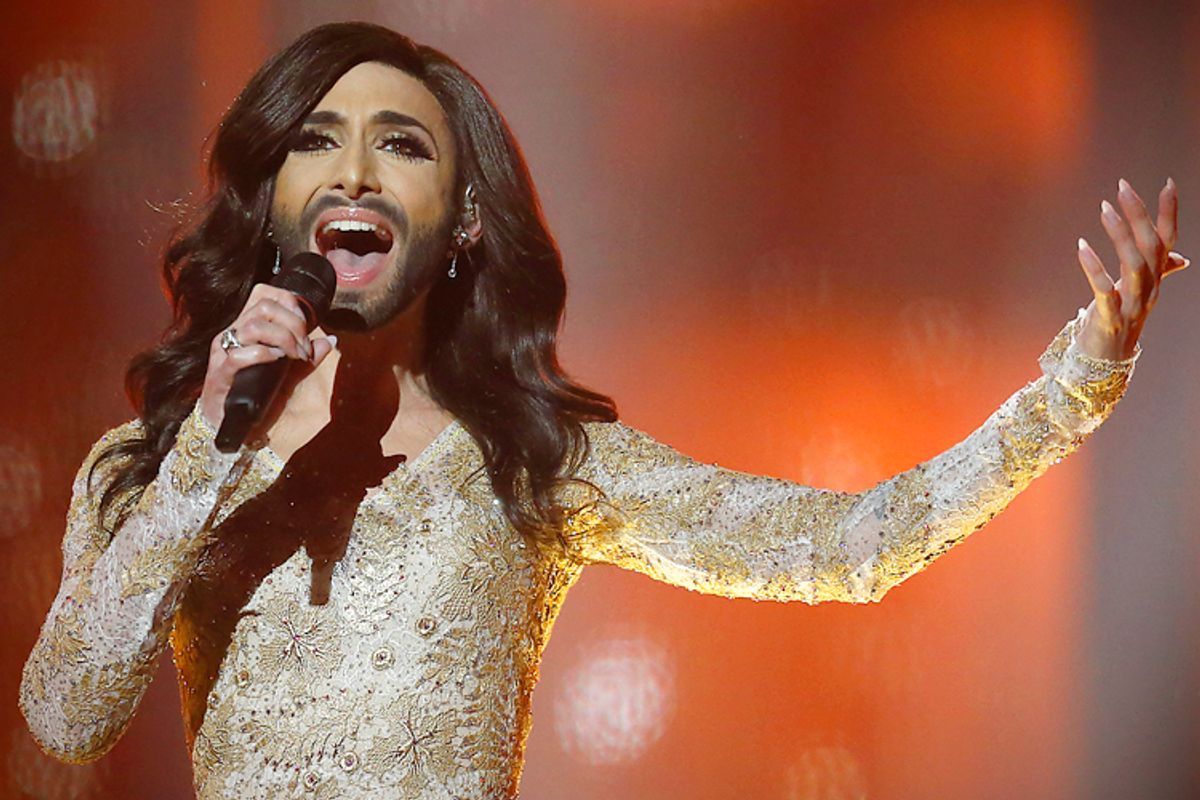"You're born naked," a famed sage once said, "and the rest is drag." But in just the past few weeks, Ru Paul's maxim about how we challenge gender -- and what it means to be male, female or anywhere in between – has been getting a serous pop culture workout. And nowhere has that been more evident that in the Eurovision triumph this weekend of Conchita Wurst. Wurst, who's been described as everything from "Austria's bearded lady " to "a cross between Jesus and Kim Kardashian," took Europe's venerable song competition with the torchy "Rise Like a Phoenix." It was a song delivered in a simmering gown and full facial hair – and above the protests and petitions regarding Wurst's presence circulated in Armenia, Belarus and Russia.
Even for drag, this was unique. In life, we're most accustomed to people who identify as, and are identifiable as, male or female. A drag character is usually accepted as opposite gender while in character, however the person may define offstage. Trans men and women frequently (but not always) leave behind one name and gender identity for another, as Chelsea Manning did when she recently announced her legal name change. And Eurovision's even already had a transgender winner, when Dana International took the top prize in 1998.
But not everyone makes firm distinctions. Three years ago, in a candid New York magazine profile, performer Justin Vivian Bond, creator of the legendary character Kiki DuRane, announced, "I used to be a man, but now I’m a trans person. Nothing has changed, just the words. And the prescriptions." On Bond's site, the performer, who eschews traditional gender pronouns, says, "For me to claim to be 'a woman' would feel just as false as the charade I’ve been asked to play for so much of my life of being 'a man.'" Earlier this year, Facebook opened up nearly 50 new gender identities for users to choose from, including "androgynous, bi-gender, intersex, gender fluid, and transsexual." And if you need further evidence that gender – even transgender – isn't always defined exclusively as maleness or femaleness, behold this year's Tony-nominated Broadway blockbuster: "Hedwig and the Angry Inch." The "inch," by the way, is a spoiler. The enduring, adored character of Hedwig, currently personified by Neil Patrick Harris, may wear blond wigs and high heels, but lives "in the divide between east and west, slavery and freedom, male and female."
Newly crowed Eurovision victor Wurst, meanwhile, identifies as male offstage – his given name is Thomas – but describes himself as having "two hearts beating in my chest." He says that "The private person Tom Neuwirth and the art figure Conchita Wurst respect each other from the bottom of their hearts. They are two individual characters with their own individual stories, but with one essential message for tolerance and against discrimination." Unique persona aside, Wurst's Eurovision win may still only ever yield him Díma Bilán-level international musical stardom, but right now, the 25-year-old Wurst says the win is evidence "that people want to move on, to look to the future." And though in his bio Wurst says, "It's not about appearances; it's about the human being," after the competition he couldn't help but add, "I’m just a singer in a fabulous dress, with great hair and a beard."



Shares